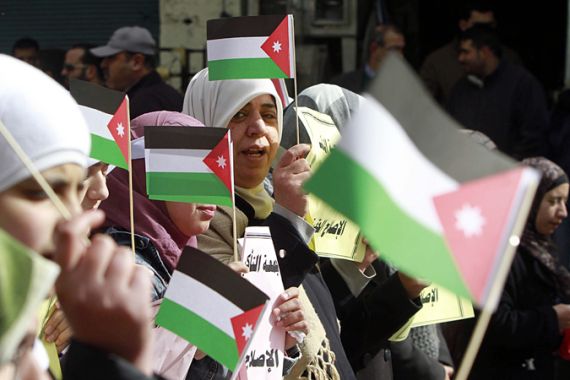Jordan’s women fight for political representation
A campaign to increase the women’s quota in parliament poses deeper questions about political representation in Jordan.

Amman – A campaign to increase the women’s quota in Jordanian parliament was dealt a blow last week when Jordan’s Lower House voted down a proposal to increase the number of female representatives to 23, putting an end to weeks of campaigning.
The campaign, entitled “Because she can … the country deserves”, was spearheaded by the Jordanian National Committee for Women’s Affairs. Campaigners and female MPs expressed disappointment at the outcome.
Keep reading
list of 4 itemsTen years after Chibok girls kidnapping: One woman’s struggle to move on
Poland lawmakers take steps towards liberalising abortion laws
Polish lawmakers debate reforming strict abortion laws
“The discussions were democratic,” MP Wafa Bani Mustafa told Al Jazeera. “But I was frustrated about the lack of success … especially on the proposal on Article 8, which provides for increasing the number of women’s seats.”
The decision against the increase came amid debate over Jordan’s new election law, a crucial piece of legislation that will set the terms for national elections expected to take place towards the end of 2016. Under the draft bill that replaces the controversial one-person-one-vote system introduced in 1993, the country is split into 23 electoral districts. Citizens will vote for a multi-member list in their constituency, and will also be able to select their preferred candidates within that list.
IN PICTURES: Women in Jordan fight for their rights
Bani Mustafa, one of the 18 current female members of parliament, has voiced support for the campaign calling for one reserved seat for women in each of Jordan’s 23 constituencies, rather than its 15 larger governorates.
Historically we have never seen women from a citizenship approach. Women are seen as a minority, as a marginalised group and an add-on to society.
But for campaigners, the results of the deliberations have left a bitter taste. Salma Nims, the head of the Jordanian National Commission for Women, says that among other challenges, some conservative social elements have restricted the pace of change in parliament.
“Historically we have never seen women from a citizenship approach. Women are seen as a minority, as a marginalised group and an add-on to society,” Nims said.
Women’s groups also say they did not have a strong voice in the debate over the draft election law.
“We had to wait for the draft law to come out in order to know how to decide our moves,” Nims told Al Jazeera. “I think the draft law is actually below our ambitions. We should reach 50/50. We should look at a law that, for example, has women on the lists, that 50, 30 percent of the lists should be women. But the law itself did not provide for that.”
Amid discussions over the new election law, the older one-person-one-vote system was criticised for encouraging voting based on tribal alliances, bribery and favours, and for marginalising political parties and bloc-building in favour of a fragmented, individualistic system.
“There’s no form of programmatic or political party representation in parliament – it became a service-oriented parliament,” Nims said.
When people vote based on tribal or personal loyalties in small districts, she explained, there is often an absence of critical voices in parliament.
“You call your MP to get a job, or to have a street paved in your town … If you look at voters who are in their 20s and 30s, they are disillusioned. As a whole, they don’t believe in the parliament as having a real role in reform.”
OPINION: Women in Jordan – Awareness is only half the battle
Last Sunday, crowds gathered outside parliament with banners and slogans in favour of female representation, and MPs protested vocally when all members of parliament were not given a chance to speak during the two-hour debate on the issue.
|
|
Hind al-Fayez, a Jordanian MP, resigned after she was prevented from speaking against police brutality, which she said she had witnessed during the demonstration. Shortly after submitting it, however, she withdrew her resignation, saying it would be a victory for her political opponents.
Fayez later voiced frustration at a parliament that she said regards itself as a “stamp” for the decisions made by the Upper House.
“This law will go to the Upper House and go through parliament without serious changes being made, but making changes is our job,” Fayez told Al Jazeera.
“[Parliamentarians] should be a filter – to see what’s good, what’s bad, to see how things can work in real life. But they see themselves as a gate.”
Some MPs said that activists created a “bad atmosphere” by shouting and screaming during the protests and using an excessively forceful approach during the debate. Fayez rejects such criticisms.

“Our job is to monitor and evaluate the government; our job is to listen to what the people want. The main concept behind an MP is that you have people behind political parties: people with ideas, a programme, a vision,” she said.
“If you don’t have strong political parties, you won’t have strong women or strong men in parliament,” she added. “We’ll see the same result, whether it’s 10 percent, 20 percent, 50 percent women. We need to go back to the roots.”
Meanwhile, campaigners say the struggle for increasing female representation in parliament is still alive. Though the new electoral law has been passed by the Lower House, it has not been approved at higher levels and could still be rejected by the king and sent back for further debate.
“It’s creating at least a viable discussion at the public level. Suddenly it’s a national dialogue,” Nims said. “For me, it’s a good step regardless if we succeed or not. At least we succeeded in having a strong collective action within civil society.”